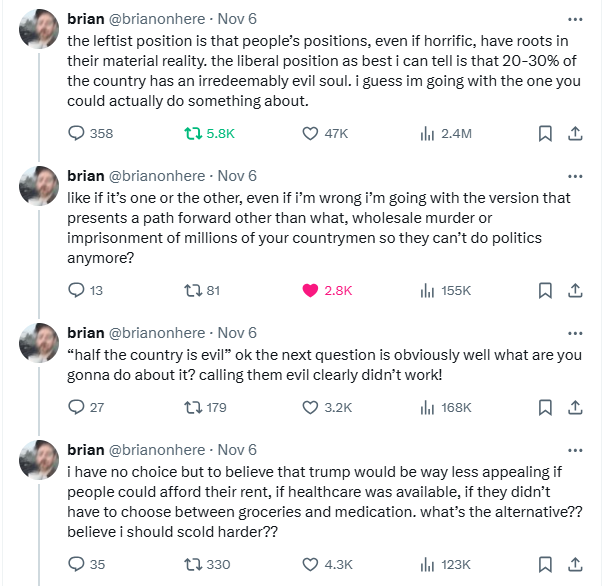I wrote something when Biden triumphed in 2020 primary, so I owe it to myself to write something now that he has presided over a historical collapse of his political project.
1.
I started writing a post in October complaining about Harris' campaign. I did not end up finishing it because I foolishly believed that her vibes-based, policy-light campaign was going to win regardless of its lack of substance, which would render my complaint somewhat irrelevant. It turns out that my cynicism, while not itself unearned or incorrect, was still directionally incorrect. It was instead Trump's fundamental lack of substance that convinced enough people (falsely of course) that he was the answer to the growing discontent of the masses. As a penance, I have finished this post below.
The common refrain from Democratic-aligned pundits is that the economy is doing well because of Democratic policies, which means you should vote for Harris/et al to let the good times roll. And yet, voter enthusiasm, especially that of the working class, lags behind this perception. Why is this?
There's a lot that can be said about this, so I want to keep it relatively simple. This means I will forgo discussion of higher-level thoughts about what "the economy" really is and if it is actually "doing well," and will instead take the Democrats' word at face value. This is easy enough to do, as your average wonk will produce plenty of charts and graphs to this effect. Start with this example:
This sure looks good! The bottom earners are making more! But real quick, which do you think is more? Nine percent of nothing, or 5% of a lot? The idea that we're not in the midst of a long, slow redistribution of wealth to the wealthy is directly undermined by the very data liberal pundits share to defend their candidate! Here's another similar example:
In this case, the ~2% difference between wage growth and inflation is indeed good. It's just that we can see the rest of the chart! The argument that a year of this trend accomplished anything more than somewhat offsetting the previous surge in inflation is fundamentally an argument to sell you nothing but crumbs. Put another way, it's effectively a newer, friendlier trickle-down economics that supposes that some mildly positive third-order effects of economic policy are the best the working class can hope for.
Of course not every argument the Democrats put forward is for literal crumbs. There are some things that are a little bit better, which can be thought of as crumbs+. One such proposal concerns home care/long-term care for seniors, which has been a long-neglected aspect of our already pretty neglectful healthcare system. To be clear, this is a very good proposal, and its enactment would be one of the most positive political developments in years. And yet, I can't help but notice a few things in the details:
Innovate and Engage with the Private Sector: This initiative will draw upon best practices across Medicare plans as well as the private sector to expand the home care workforce, partner with technology companies in areas such as remote patient monitoring and telehealth services, as well as other private sector partnerships.
Lift Up Care Workers: This initiative will provide care workers access to better wages, improve quality of care for seniors and those with disabilities, and treat our seniors with the dignity they deserve.
Making such a benefit part of Medicare is great, but if all that Medicare money is going to private sector companies with only a weak acknowledgment of the actual labor that goes into home care, then I start to get suspicious of the true aims of this endeavor. Much like with the ACA, I view this as fundamentally a giveaway to private interests with the ancillary benefit of providing better/cheaper care to some. Perhaps this sort of bargain really is the best we can hope for, but if you believe this I'd like to ask: which end of this bargain do you think is going to be sacrificed next time there is a recession and/or a Republican-controlled government?
In the end the case Harris is making is that Biden has given us crumbs and she hopes to give us crumbs+. Has anything really changed from Biden's lethargic campaign? And even if it has, will it be enough?
2.
Two red-state Democrats (at least) ran Senate campaigns that were not explicitly anti-trans, but did capitulate to right-wing framing on the issue in particularly gross ways. One was Sherrod Brown, who had a disgusting ad that I, as a resident of Ohio, had to see one thousand times. The other was Colin Allred, who did essentially the same thing as Brown:
3.
Moments like these often serve as good reminders that many (if not most) Democratic electeds are really just Republicans and/or fascist enablers at heart. Any serious movement to combat Trump and his policies must treat these people as the enemies that they are.
Historian Robin D.G. Kelley discusses Donald Trump's election victory and why the Democrats failed to mount a successful challenge. pic.twitter.com/DbQ5oO7BzO
— Democracy Now! (@democracynow) November 7, 2024
New 2022 body cam footage shows Atlanta PD cops manufacturing felonies to arrest Cop City protesters. When local officers say there were no felonies, APD Major says, "help us out…I know it's a reach." Those charges were then used for RICO charges against bail fund leaders.
— Radley Balko (@radleybalko.bsky.social) November 7, 2024 at 7:38 AM
[image or embed]








No comments:
Post a Comment